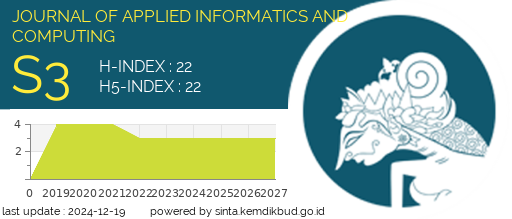IndoBERT Model Analysis: Twitter Sentiments on Indonesia's 2024 Presidential Election
DOI:
https://doi.org/10.30871/jaic.v8i1.7440Keywords:
Election, IndoBERT, Sentiment Analysis, TwitterAbstract
Elections are one of the key moments in a country's democracy. Indonesian elections have a significant impact on regional and global politics. Twitter being one of the popular social media platforms becomes a powerful tool for political campaigns. This makes it an ideal source to analyze public opinion during the 2024 general election, particularly the upcoming Presidential Election (Pilpres). IndoBERT is the model chosen to analyse the sentiment from the dataset in this study using a zero-shot learning approach. Based on the evaluation results, the accuracy value of the 2024 presidential election classification is 0.60 (60%), tends to predict with a good value in the positive label of 0.74 (74%) for F1-Score. This model is considered quite good at predicting negative labels but the results are not too optimal with a value of 0.49 (49%). Confusion Matrix in this IndoBERT model is more likely to label tweets with positive things, by detecting negative labels quite well.
Downloads
References
DATAREPORTAL, "TWITTER USERS, STATS, DATA & TRENDS," We Are Social, 2023. https://datareportal.com/essential-twitter-stats?utm_source=DataReportal&utm_medium=Country_Article_Hyperlink&utm_campaign=Digital_2023&utm_term=Indonesia&utm_content=Facebook_Stats_Link (accessed Oct. 25, 2023).
I. Krismantari and N. Fitri Ramadhani, "Pemilu 2024 akan jadi pesta demokrasi terbesar di dunia: 5 hal yang perlu kamu ketahui," The Conversation, 2023. https://theconversation.com/pemilu-2024-akan-jadi-pesta-demokrasi-terbesar-di-dunia-5-hal-yang-perlu-kamu-ketahui-211069 (accessed Oct. 25, 2023).
I. Kurniawan and A. Susanto, "Implementasi Metode K-Means dan Naïve Bayes Classifier untuk Analisis Sentimen Pemilihan Presiden (Pilpres) 2019," Eksplora Inform., vol. 9, no. 1, pp. 1"“10, 2019, doi: 10.30864/eksplora.v9i1.237.
T. Patrio Sorongan, "Daftar 10 Negara Terluas di Dunia, Indonesia Nomor Berapa?," CNBC Indonesia, 2023. https://cnbc.id/NlOCBq (accessed Oct. 24, 2023).
F. Zahria Emeraldien, R. Jefri Sunarsono, and R. Alit, "Twitter Sebagai Platform Komunikasi Politik Di Indonesia," J. Teknol. dan Inf., vol. 14, no. 1, pp. 21"“30, 2019, [Online]. Available: www.statisticbrain.com.
M. A. Muqsith, Pesan Politik di Media Sosial Twitter. Surabaya: Jakad Media Publishing, 2022.
A. Perdana, A. Hermawan, and D. Avianto, "Analisis Sentimen Terhadap Isu Penundaan Pemilu di Twitter Menggunakan Naive Bayes Clasifier," J. Sisfokom (Sistem Inf. dan Komputer), vol. 11, no. 2, pp. 195"“200, 2022, doi: 10.32736/sisfokom.v11i2.1412.
S. M. P. Tyas, R. Sarno, A. T. Haryono, and K. R. Sungkono, "A Robustly Optimized BERT using Random Oversampling for Analyzing Imbalanced Stock News Sentiment Data," in 2023 International Conference on Computer Science, Information Technology and Engineering (ICCoSITE), 2023, pp. 897"“902, doi: 10.1109/ICCoSITE57641.2023.10127725.
Biro Humas Lemhannas RI, "Pemilu 2024 Waktunya Demokrasi Gagasan, Bukan Demokrasi Pengkultusan," Biro Humas Lemhannas RI, 2022. https://www.lemhannas.go.id/index.php/publikasi/press-release/1670-pemilu-2024-waktunya-demokrasi-gagasan-bukan-demokrasi-pengkultusan (accessed Oct. 24, 2023).
P. F. Sarumaha, "TANTANGAN DAN STRATEGI DALAM MEWUJUDKAN KESUKSESAN PEMILU 2024 DI NIAS SELATAN," Bawaslu Nias Selatan, Kordiv PHL dan Humas, 2021. https://niasselatan.bawaslu.go.id/tantangan-dan-strategi-dalam-mewujudkan-kesuksesan-pemilu-2024-di-nias-selatan/ (accessed Oct. 24, 2023).
BBC NEWS INDONESIA, "Pemilu 2024: Pemilih muda, dinamika politik penuh kejutan, dan potensi polarisasi - Sejumlah hal yang perlu Anda ketahui," 2023. https://www.bbc.com/indonesia/indonesia-66531834 (accessed Oct. 24, 2023).
L. Geni, E. Yulianti, and D. I. Sensuse, "Sentiment Analysis of Tweets Before the 2024 Elections in Indonesia Using IndoBERT Language Models," J. Ilm. Tek. Elektro Komput. dan Inform., vol. 9, no. 3, pp. 746"“757, 2023, doi: 10.26555/jiteki.v9i3.26490.
B. Wilie et al., "IndoNLU: Benchmark and Resources for Evaluating Indonesian Natural Language Understanding," in Proceedings of the 1st Conference of the Asia-Pacific Chapter of the Association for Computational Linguistics and the 10thInternational Joint Conference on Natural Language Processing, 2020, pp. 843"“857, doi: https://doi.org/10.48550/arXiv.2009.05387.
G. Shetty, A. Nair, P. Vishwanath, and A. Stuti, "Sentiment Analysis and Classification on Twitter Spam Account Dataset," Proc. - 2020 Adv. Comput. Commun. Technol. High Perform. Appl. ACCTHPA 2020, pp. 111"“114, 2020, doi: 10.1109/ACCTHPA49271.2020.9213206.
S. Tabinda Kokab, S. Asghar, and N. Shehneela, "Transformer-based deep learning models for the sentiment analysis of social media data," Array, vol. 14, p. 100157, 2022, doi: https://doi.org/10.1016/j.array.2022.100157.
Downloads
Published
How to Cite
Issue
Section
License
Copyright (c) 2024 Dwi Ismiyana Putri, Ari Nurul Alfian, Mardi Yudhi Putra, Putro Dwi Mulyo

This work is licensed under a Creative Commons Attribution-ShareAlike 4.0 International License.
Authors who publish with this journal agree to the following terms:
- Authors retain copyright and grant the journal right of first publication with the work simultaneously licensed under a Creative Commons Attribution License (Attribution-ShareAlike 4.0 International (CC BY-SA 4.0) ) that allows others to share the work with an acknowledgement of the work's authorship and initial publication in this journal.
- Authors are able to enter into separate, additional contractual arrangements for the non-exclusive distribution of the journal's published version of the work (e.g., post it to an institutional repository or publish it in a book), with an acknowledgement of its initial publication in this journal.
- Authors are permitted and encouraged to post their work online (e.g., in institutional repositories or on their website) prior to and during the submission process, as it can lead to productive exchanges, as well as earlier and greater citation of published work (See The Effect of Open Access).











